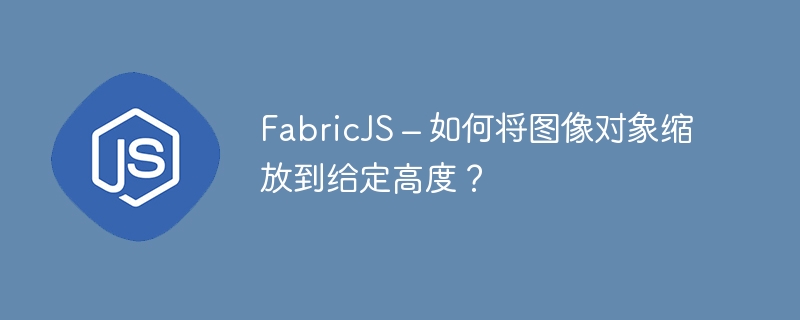

In this tutorial, we will learn how to scale an Image object to a given height using FabricJS. We can create an Image object by creating an instance of fabric.Image. Since it is one of the basic elements of FabricJS, we can also easily customize it by applying properties such as angle, opacity, etc. To scale an Image object to a given height, we use the scaleToHeight method.
scaleToHeight(value: Number, absolute: Boolean): fabric.Object
value - This parameter accepts a Number, which determines the new height value of the Image object.
< /里>absolute - This parameter accepts a boolean value that determines whether the viewport is ignored.
Let's look at a code example to see what the image object looks like without using the scaleToHeight method. In this case, our image object will not scale horizontally or vertically.
<!DOCTYPE html>
<html>
<head>
<!-- Adding the Fabric JS Library-->
<script src="https://cdnjs.cloudflare.com/ajax/libs/fabric.js/510/fabric.min.js"></script>
</head>
<body>
<h2>Default appearance of the Image object</h2>
<p>
You can see that the object has not been scaled in horizontal or vertical direction
</p>
<canvas id="canvas"></canvas>
<img src="https://www.tutorialspoint.com/images/logo.png" id="img1" style="display: none" />
<script>
// Initiate a canvas instance
var canvas = new fabric.Canvas("canvas");
canvas.setWidth(document.body.scrollWidth);
canvas.setHeight(250);
// Initiating the image element
var imageElement = document.getElementById("img1");
// Initiate an Image object
var image = new fabric.Image(imageElement, {
top: 50,
left: 110,
});
// Add it to the canvas
canvas.add(image);
</script>
</body>
</html>
In this example, we will see how to scale an image object to a given height by assigning a value to the scaleToHeight method. Since we have passed the value as 100, this will be the new height of the image object.
<!DOCTYPE html>
<html>
<head>
<!-- Adding the Fabric JS Library-->
<script src="https://cdnjs.cloudflare.com/ajax/libs/fabric.js/510/fabric.min.js"></script>
</head>
<body>
<h2>Passing the scaleToHeight method with a custom value</h2>
<p>You can see that the new height of our image object is 100</p>
<canvas id="canvas"></canvas>
<img src="https://www.tutorialspoint.com/images/logo.png" id="img1" style="display: none" />
<script>
// Initiate a canvas instance
var canvas = new fabric.Canvas("canvas");
canvas.setWidth(document.body.scrollWidth);
canvas.setHeight(250);
// Initiating the image element
var imageElement = document.getElementById("img1");
// Initiate an Image object
var image = new fabric.Image(imageElement, {
top: 50,
left: 110,
});
// Using scaleToHeight method
image.scaleToHeight(100, false);
// Add it to the canvas
canvas.add(image);
</script>
</body>
</html>
The above is the detailed content of FabricJS - How to scale an image object to a given height?. For more information, please follow other related articles on the PHP Chinese website!
 Blue screen code 0x000009c
Blue screen code 0x000009c
 A collection of common computer commands
A collection of common computer commands
 You need permission from admin to make changes to this file
You need permission from admin to make changes to this file
 Tutorial on turning off Windows 11 Security Center
Tutorial on turning off Windows 11 Security Center
 How to set up a domain name that automatically jumps
How to set up a domain name that automatically jumps
 What are the virtual currencies that may surge in 2024?
What are the virtual currencies that may surge in 2024?
 The reason why header function returns 404 failure
The reason why header function returns 404 failure
 How to use js code
How to use js code




